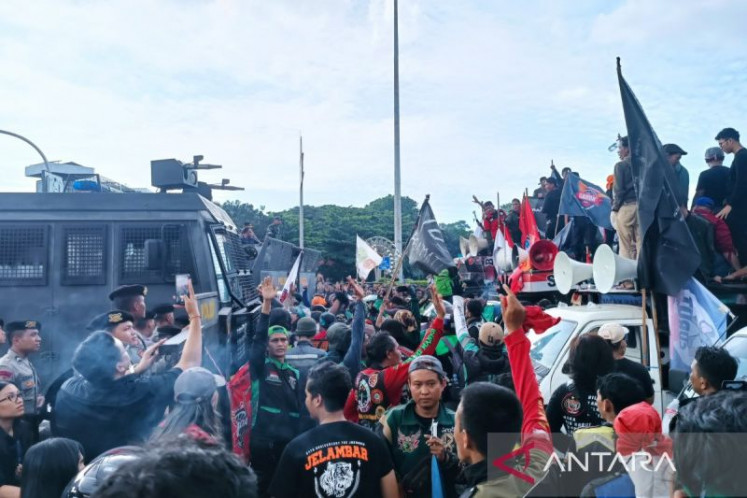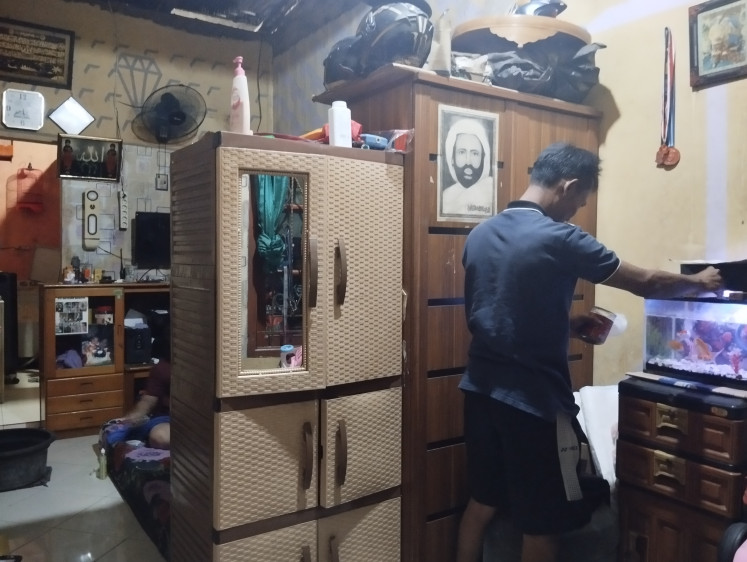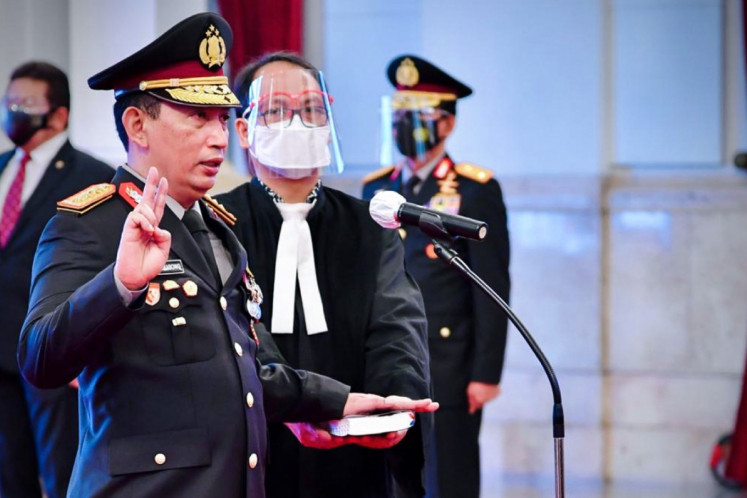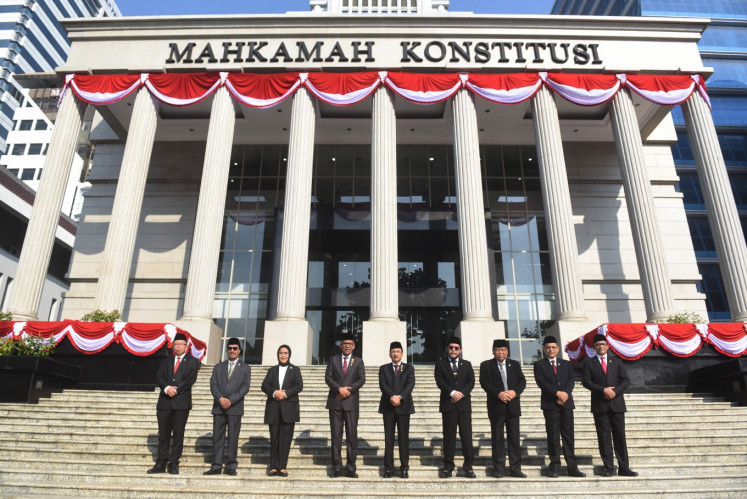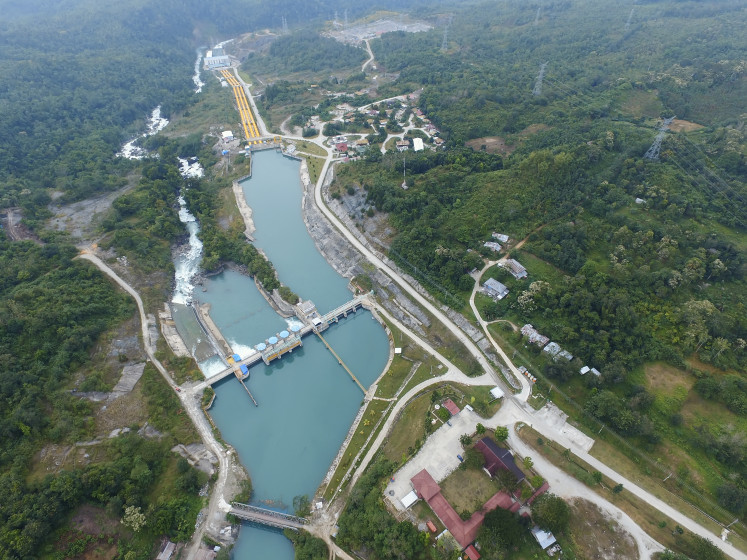Popular Reads
Top Results
Can't find what you're looking for?
View all search resultsPopular Reads
Top Results
Can't find what you're looking for?
View all search resultsEurope must raise its game with EU-ASEAN ties
ASEAN is central to the EU’s Indo-Pacific policy and the regional bloc has explicitly called for greater engagement with all its dialogue partner.
Change text size
Gift Premium Articles
to Anyone
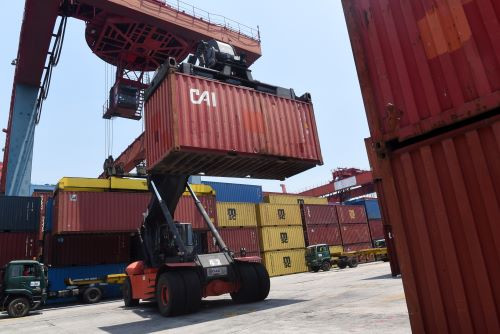 Maintaining lift: A worker uses a container lift truck on Sept. 17, 2024 at Tanjung Priok Port in North Jakarta. Statistics Indonesia (BPS) reported in August 2024 that the country had recorded a trade surplus for the 52th successive month. (Antara/Indrianto Eko Suwarso)
Maintaining lift: A worker uses a container lift truck on Sept. 17, 2024 at Tanjung Priok Port in North Jakarta. Statistics Indonesia (BPS) reported in August 2024 that the country had recorded a trade surplus for the 52th successive month. (Antara/Indrianto Eko Suwarso)
T
he latest European Union-ASEAN Business Sentiment Survey reveals a record 59 percent of European businesses felt that the EU is not playing its part in supporting their interests in Southeast Asia, marking the highest level of dissatisfaction since the survey was launched in 2015.
It is not just the companies talking; speaking to ministers, senior officials and policymakers across Southeast Asia as I regularly do, the EU is clearly missing key passes where other global players are all too eager to take possession.
A case in point is the recent ASEAN Ministers for Energy Meeting in Vientiane, where most dialogue partners were present, but the EU was absent despite having so much to offer in areas like energy transition and the development of a regional power grid.
In short, the EU must get back in the game before it risks conceding ground to more active players.
This might seem like a controversial offside call to some. The EU’s track record in ASEAN is commendable: it is among the region's largest aid and development donors, with several hundred million euros in play across ASEAN Community pillars and more funds allocated for future initiatives. However, the EU has not celebrated these achievements enough.
Over the past decade of working on EU-ASEAN business relations, I can confidently say we have scored high in our trade and investment interactions with ASEAN.
Free Trade Agreements (FTAs) have been sealed with Vietnam and Singapore, which also recently signed a Digital Trade Agreement with the EU, while ongoing FTA negotiations with Indonesia, Thailand, and soon, the Philippines, are dribbling toward even stronger ties. Add to that the trade preference arrangements with several other ASEAN member states, and the efforts of the Joint Working Group on EU-ASEAN Trade and Investment, it is clear that on the trade front, we are making great strides. Credit is due to the team at the Directorate General of Trade in Brussels for keeping up the momentum and advancing this progress.
Meanwhile, the EU and ASEAN now share a strategic partnership, bolstered by a plan of action to bring it to life. On paper, it is an impressive game plan, highlighting many potential and actual areas of collaboration.
Yet, much of the action remains under the radar, uncheered and uncelebrated. That is a pity and a missed goal opportunity for Europe, especially when ASEAN’s other dialogue partners are quick to trumpet their achievements with great fanfare, even when their contributions to the region are smaller in comparison.
It should come as no surprise then, that many of these countries enjoy a comprehensive strategic partnership with ASEAN, while the EU is left waiting, hoping to get an upgrade in 2027 when both sides celebrate 50 years of bilateral relations.
By keeping the momentum going and better showcasing its contributions, the EU can still score big and solidify its position as a stronger partner in the region.
ASEAN is central to the EU’s Indo-Pacific policy and the regional bloc has explicitly called for greater engagement with all its dialogue partners, to balance geopolitical dynamics and drive more just, equitable and sustainable regional development.
Yet, despite these clear signals, the EU’s response has been lukewarm, creating a vacuum that is being filled by other global players, including Russia and China, who are more than willing to exploit the opportunities that come with deeper engagement.
The biggest concern for European businesses is the glaring lack of EU engagement at the highest levels in key areas. There was another opportunity for a meeting between the EU and ASEAN Economic Ministers (AEM) in September, which is traditionally one of the most important region-to-region interactions.
A European trade commissioner has not physically met their ASEAN counterparts in person since 2018, and that was the case again this year, though perhaps with good reason given the recent changes in the College of Commissioners.
There have been legitimate reasons, such as travel restrictions during the COVID-19 pandemic, but in a region where ASEAN’s other dialogue partners consistently show up at the ministerial level, this absence is noticeable.
Beyond the AEM-EU consultations, the only other regular ministerial meeting has been with ASEAN foreign ministers, where High Representative for Foreign Affairs and Security Policy Josep Borrell and his predecessor Federica Mogherini have been ever present at Post-Ministerial Dialogues. This week does see the return of EU Council President Charles Michel to the East Asia Summit, but that is not a regular feature.
The Economic Ministers’ meeting is one of many forums where the EU has been missing. While countries like the United States, China, Japan, South Korea and Australia are engaging at the highest levels in regular meetings with ASEAN ministerial bodies on digital, health, agriculture, energy, transportation, customs and financial services issues, the EU is often only represented at senior officials’ level, and frequently not from those traveling from Brussels.
This leaves European businesses navigating the complexities of the ASEAN market without the high-level political support that their competitors enjoy. The lack of EU representation puts us at a distinct disadvantage, we miss out on the opportunity to influence regulations, standards and policies that directly impact our regional operations.
There is also a growing suspicion that European companies are being edged out in favor of competitors from other countries whose governments are more visibly and actively engaging with ASEAN.
This is a matter of more than optics. It sends a message: the EU is just not as committed to ASEAN as others. This has the potential to undo years of trust and good work that has been built. The EU’s slip in the recent State of Southeast Asia survey reflects this, potentially harming the long-term prospects of European businesses in the region.
There is still time for the EU to step up its play with ASEAN, but it requires more than just words on paper. Ministerial-level representation on energy issues would be a good start, Europe has established a continent-wide power grid and should have winning strategies to share with ASEAN as the region develops its own power grid.
It should also play a more active role in the digital economy space, especially as ASEAN negotiates what would be the world’s first regional agreement on the digital economy. Given how the European Green Deal has ruffled feathers in this part of the world, high-level engagement with ASEAN environment ministers is a clear penalty kick opportunity.
As economic and geopolitical alliances are increasingly shaped by who is on the field, the EU cannot afford to be seen sitting on the bench. Admittedly, dealing with ASEAN is not always easy, and there will be rough patches, as there are in any relationship. But ASEAN likes to be valued, to feel part of the first team, and that means making an effort to visit even when there are no grand announcements to make.
Europe and ASEAN need each other as partners, just like soccer teammates who rely on close coordination. With a new European Commission now being formed, we can only hope it will strengthen its engagement with ASEAN in the future and see more European commissioners working side by side with their ASEAN counterparts.
This will ensure both the EU and European businesses have a strong voice in ASEAN’s most crucial matches, allowing them to continue to thrive in this dynamic region.
***
The writer is executive director of the EU-ASEAN Business Council.





